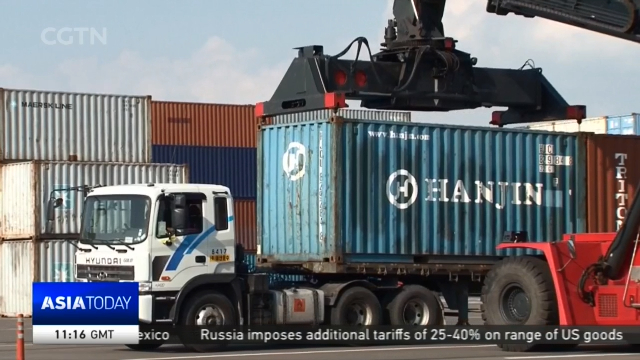
19:31, 06-Aug-2018
The Trouble with Tariffs: South Korea worries about impact of trade war
Updated
19:18, 09-Aug-2018
02:59

South Korea's finance minister has warned that an all-out trade war between the U.S. and China would have grim implications for his country. Many of South Korea's exported goods are intermediary parts that end up in Chinese products heading to the United States. CGTN's Jack Barton has this report from Seoul.
As the trade war escalates between China and the United States, South Korea is bracing itself for collateral damage.
LEE BYUNGTAE CEO, VENTURE INVESTMENT HOLDINGS "We are fully exposed to this uncertainty and damage from this trade war."
The reason is that South Korea is a major exporter of intermediary parts to China, which are components that go into products built in China that are then often shipped to the U.S.
LEE BYUNGTAE CEO, VENTURE INVESTMENT HOLDINGS "Only five percent of Korean products to China are consumer products the other 95 percent are intermediary".
It's already causing a cost-competitive rethink among many South Korean firms.
PROF. KIM BOWON KAIST BUSINESS SCHOOL "In the long run if this trade war between the U.S. and China continues, companies will rethink their strategy, so rather than supply their intermediary goods and parts to manufacturers in China, Korean companies themselves will start making these finished goods."
South Korea has also been hit directly by recent U.S. trade measures, which has led to the renegotiating of an existing trade deal. That has not stopped Donald Trump from threatening more tariffs, especially on vehicles.
JACK BARTON SEOUL "Critics of the plan warn potential tariffs of up to 25 percent, plus the inevitable retaliatory measures, could add thousands of dollars to the price of a vehicle, and put a big dent in, not just South Korea's, but the global auto industry, leading to mass layoffs."
The biggest concern though seems to stem from a perceived lack of clarity with many current U.S. policies.
PROF. KIM BOWON KAIST BUSINESS SCHOOL "In the politics, in the economic policies, in diplomacy, everything is so confused, everything looks so tightly related with each other. So I think in the long run many Korean companies will endure any economic tariffs or any economic restraint, but as long as all these economic policies are tangled with political aspects, it's very difficult to understand what these companies should do."
Many analysts say it's likely to take up to several months before the fallout from the White House's new protectionist policies can be accurately gauged. Jack Barton, CGTN, Seoul.

SITEMAP
Copyright © 2018 CGTN. Beijing ICP prepared NO.16065310-3
Copyright © 2018 CGTN. Beijing ICP prepared NO.16065310-3